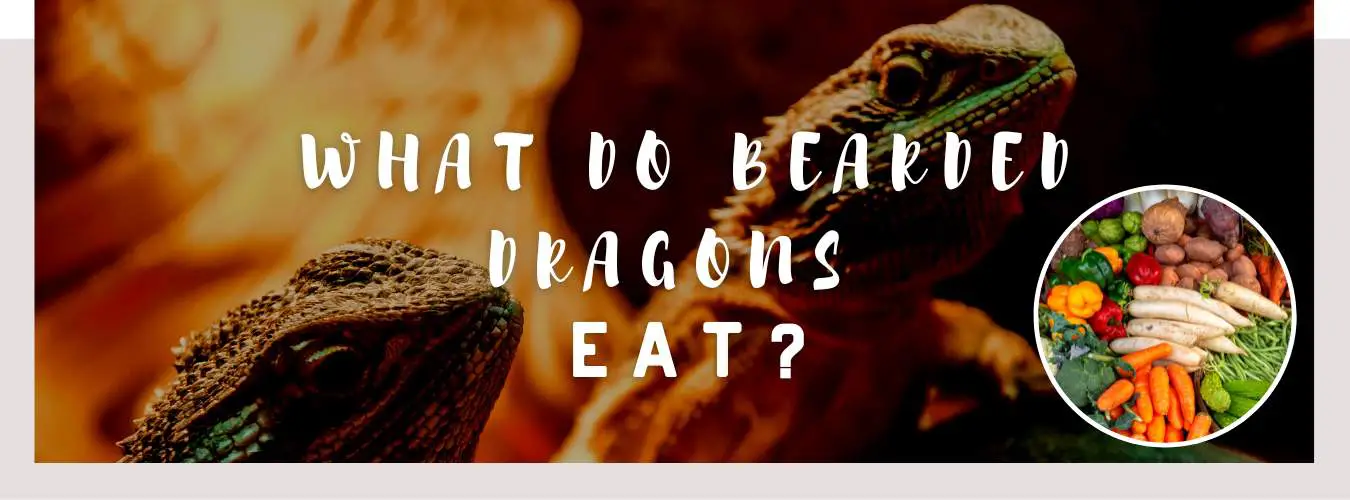
Bearded dragons eat insects, vegetables, and fruits. They can even eat smaller animals like mice.
They are omnivores, which means that, just like humans, they can eat a wide variety of foods.
But not all foods are safe, and some can even be toxic. So when answering the question of “What do bearded dragons eat?” – There are quite a few things to keep in mind.
We’ve therefore created the ultimate guide to the best bearded dragons diet, complete with an easy food list, charts, and even a feeding schedule.
So let’s get into how you can keep a beardie healthy and happy by what it’s fed.
This is a big guide, and we have divided it into different food groups and regular questions around hydration and appetite. So feel free to use the jump links to get to the section you’re most interested in.
Be sure you don’t miss our easy infographic at the very end, which summarizes everything.
It’s also an excellent quick reference guide whenever you have a question about a particular food. So make sure you bookmark it for future use.
Contents
- 1 Insects & Live Feed
- 2 Best Insects for Bearded Dragons to Eat
- 3 Best Greens for Bearded Dragons to Eat
- 4 Best Veggies for Bearded Dragons to Eat
- 5 Best Fruit for Bearded Dragons to Eat
- 6 Best Weeds for Bearded Dragons to eat
- 7 Foods Bearded Dragons Can’t Eat
- 8 Important Vitamins
- 9 The Importance of Calcium in Your Bearded Dragon’s Diet
- 10 How Often Should Bearded Dragons Eat?
- 11 Feeding Ratios – Insects vs. Plant Food?
- 12 How Much Food to Give Your Bearded Dragon
- 13 What To Do If A Bearded Dragon Is Not Eating
- 14 How To Feed A Sick Bearded Dragon
- 15 Bearded Dragon Hydration
- 16 What To Feed A Pregnant Bearded Dragon
- 17 What Do Bearded Dragons Eat In The Wild?
- 18 Common Feeding Mistakes
- 19 Conclusion
Insects & Live Feed
Insects should be a staple part of a bearded dragon’s diet. This would in the wild be the biggest source of their food and should be mimicked in captivity.
Keep in mind that you need to be careful feeding wild insects, as they can come with parasites that can be harmful.
It’s always best to get insects from a breeder or pet shop that specializes in food for reptiles. You can also even breed them yourself.
Best Insects for Bearded Dragons to Eat
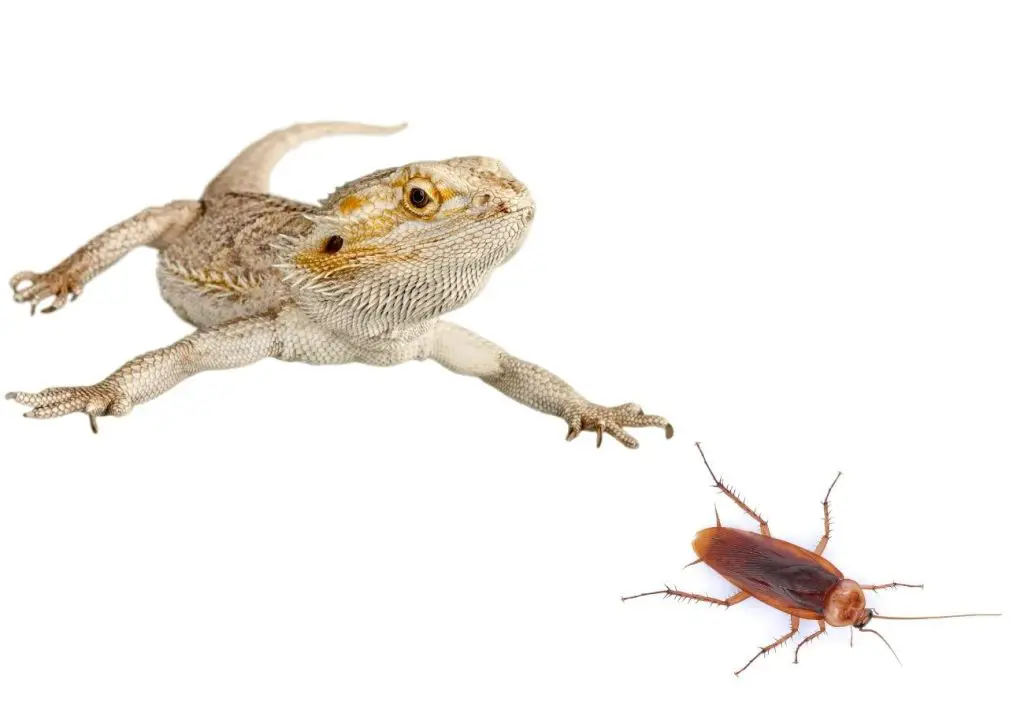
The best insects, bugs, and meats for bearded dragons are crickets and dubia roaches. They can be eaten regularly as a staple part of the diet.
Here is a list of insects a bearded dragon can eat:
- Crickets
- Locusts
- Cockroaches
- Dubia roaches
Best Worms for Bearded Dragons to Eat
While technically still insects, we’ve also broken down the best worms for bearded dragons to eat. As we point out, some of them should only be fed to adults, or sparingly.
Worms that can be fed regularly:
- Kingworms
- Earthworms
- Silkworms
- Butterworms
- Phoenix worms
Additional worms that you can also feed, but mainly as a treat due to the high-fat content are:
- Waxworms
- Morioworms
- Mealworms (only feed to adult bearded dragons as they have a hard outer layer).
- Superworms (only feed to adult bearded dragons as they are quite large).
Best Greens for Bearded Dragons to Eat
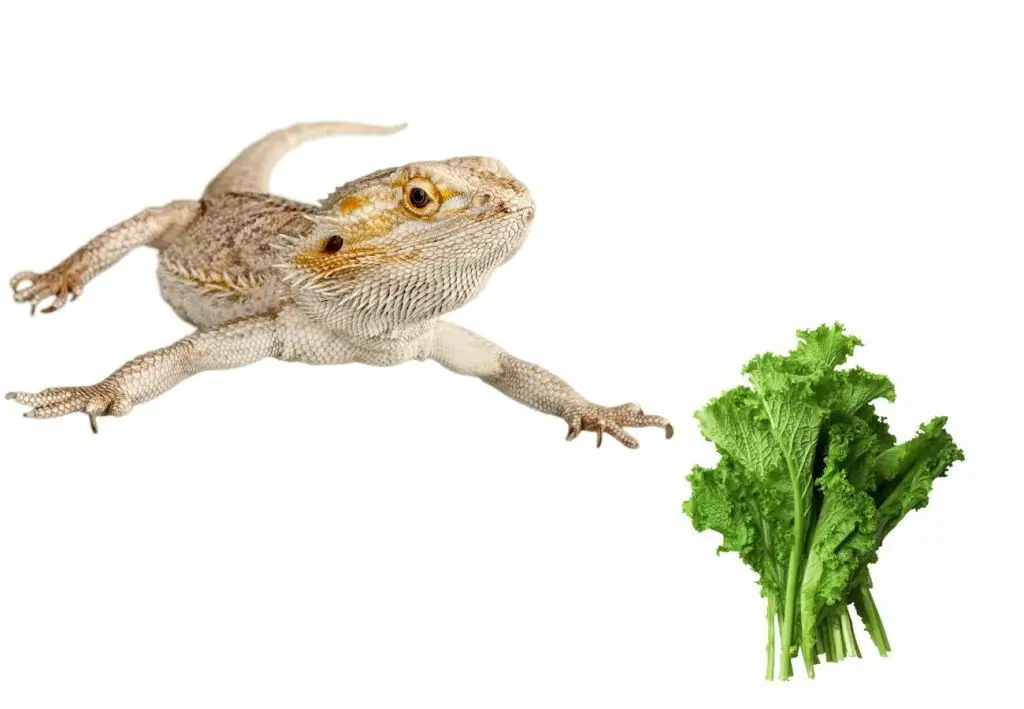
There are a number of greens that you can also feed regularly. They’re full of vitamins and flavor, and will usually be thoroughly enjoyed by your beardie.
These are some of the best greens for bearded dragons to eat.
- Spring greens
- Floret mix
- Lambs lettuce
- Dandelion greens
- Turnip greens
- Mustard greens
- Endive
- Rocket
- Coriander
- Watercress
- Kale
- Collards
- Parsley
- Clover
You might also like: Can Bearded Dragons Eat Bread?
Best Veggies for Bearded Dragons to Eat
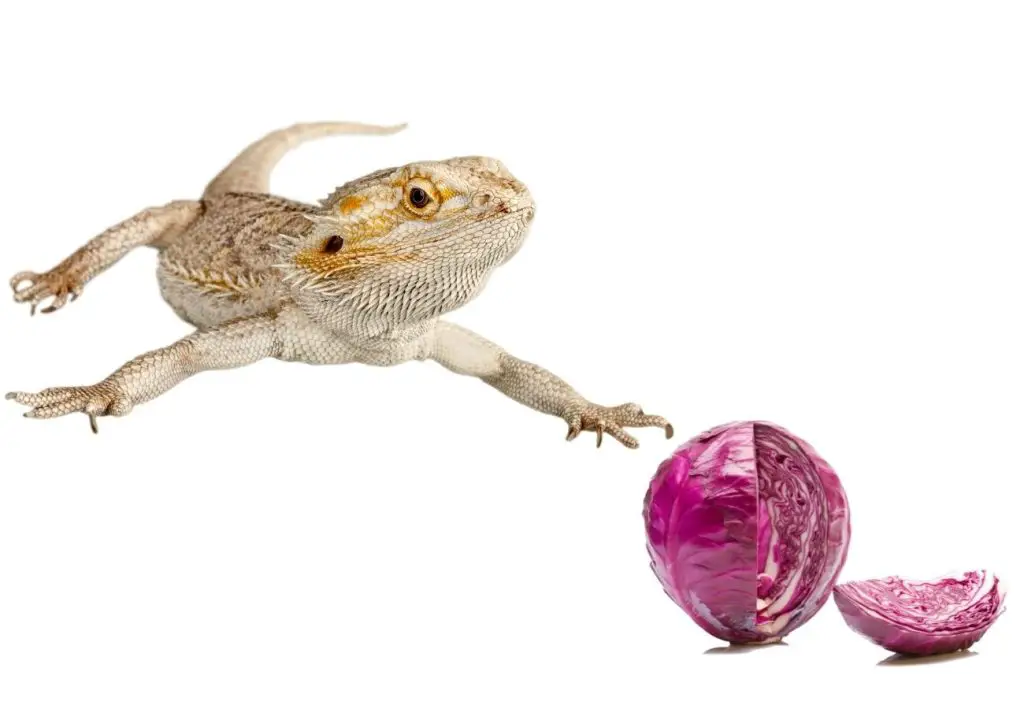
The best vegetables for bearded dragons to eat are:
- Pak choi
- Yellow squash
- Asparagus
- Okra
- Swiss chard
- Peas
- Green beans
- Courgette
- Butternut squash
- Sweet potato
- Bell pepper
- Ocra
- Acorn squash
- Cabbage
- Kohlrabi
- Parsnip
Broccoli can also be included in this list, but only in small pieces on a weekly basis.
Best Fruit for Bearded Dragons to Eat

Bearded dragons can eat fruits of a different variety. But granted the higher sugar content these should generally be fed as a treat, more than a daily staple.
In general, avoid feeding citrus fruits as these can cause stomach issues.
Stick to these fruits as an occasional treat:
- Kiwi
- Pears
- Guava
- Grapes
- Raisins
- Apricots
- Figs
- Watermelon
- Apples
- Mango
- Papaya
- Dates
- Peaches
- Apricots
- Plums
Best Berries for Bearded Dragons to Eat

If you have some berries around, these are also something you can share with a bearded dragon.
The best ones to feed are:
Best Weeds for Bearded Dragons to eat
Some of the top weeds that you can feed to your bearded dragons are:
- Dead nettle
- Plantain
- Dandelion
- Casear
Foods Bearded Dragons Can’t Eat
Not only is it important that you only feed your bearded dragons healthy, nutritious foods – but you also need to keep them away from foods that can be harmful or even toxic.
Some of the things you should never feed a beardie are:
Important Vitamins
A varied diet is important to ensure that your beardie gets all the vitamins and nutrients that it needs. These are some of the key vitamins that are important they get sufficient amount of, and what they do.
- Vitamin A promotes eye health and supports the immune system. In addition, it aids in reproduction and assists in proper lung, heart, and kidney function.
- Vitamin C or ascorbic acid is a significant nutrient found in many fruit and vegetables. Vitamin C aids proper growth and development, supports immune health, and helps keep bones and teeth strong.
- Vitamin E repairs damaged cells and prevent inflammation
- Vitamin K is essential for tissue and blood cell maintenance
- Vitamin K1 regulates blood clotting and supports bone health
- Folate assists in tissue growth and cell maintenance
- Antioxidants strengthen the immune system and also your bearded dragon’s digestive system
- Manganese helps regulate metabolism and blood clotting
- Zinc helps maintain recovery after injury
- Fiber aids in digestive function, prevents impaction and constipation, and softens hard stools.
- Iron is essential for baby bearded dragons as they grow and develop. It boosts immune health and muscle function and transports oxygen throughout the body.
- Magnesium strengthens bones, normalizes blood pressure, and supports heart function.
- Potassium regulates blood pressure and the nervous system. It also helps keep your beardie’s muscles working and retain proper water retention.
The Importance of Calcium in Your Bearded Dragon’s Diet
Calcium is vital for your bearded dragon’s health and wellbeing. So it can be natural to question if you’re providing enough.
Bearded dragons need calcium for different reasons, but amongst the primary ones are:
- Bone development
- Muscle contractions
- Proper egg development & good reproductive health in females
Dragons’ bodies need calcium so much that if the body becomes deficient, it starts pulling calcium from its bones, causing metabolic bone disease (MBD). Unfortunately, MBD is one of the most common diseases among domestic bearded dragons, but it’s so easily preventable with proper diet and care.
Metabolic bone disease refers to several painful skeletal disorders caused by a lack of calcium in the body. The condition causes severe bone, muscle, and tissue damage, resulting in paralysis or death.
Alert your vet immediately if you notice any signs of metabolic bone disease in your bearded dragon. These include:
- Lack of appetite
- Lethargy and weakness
- Stress
- Constipation
- Receded lower jaw
- Swollen limbs and jaw
- Bumps along the spine or bones
- Soft jaw and facial bones
- Bowed limbs and arched spine
- Fractures and broken bones
- Greenstick fractures (folded or bent bones)
- Trembling and twitching limbs
- Tremors and seizures
- Paralysis or difficulty moving
If your bearded dragon is deficient in calcium, any of the following could be the culprit:
- Insufficient calcium in the diet
- Too much phosphorus or oxalates (oxalic acid) in the diet
- Poor supplementation
- Poor lighting, causing a Vitamin D3 deficiency
Dragons who suffer from metabolic bone disease have trouble doing the simplest of tasks, like walking, because their tissue is deteriorating, and their bones are soft and easily breakable. In addition, the disease is quite painful and very difficult to reverse.
So ensure you pay attention to the calcium content of the food you serve, and a supplement can also be a good idea.
You might also like: What Animal Eats Lizards?
How Often Should Bearded Dragons Eat?
As babies or hatchlings, bearded dragons can be fed three meals a day at regular intervals. However, they tend to eat less often as they age, sometimes choosing to eat only once every couple of days.
It is perfectly normal and nothing to worry about – though we do suggest that you make fresh salads available to them every day, should they need a little snack.
Here is a rough guide for insect feeding intervals based on your bearded dragon’s age:
- Babies/Hatchlings – 1-4 Months Old: 3-5 feedings per day
- Juveniles – 4-12 Months Old: 2-3 feedings per day
- Sub-Adults – 12-20 Months Old: 1-2 feedings per day
- Adults – 20+ Months Old: 1 feeding every day, or every other day
Feeding Ratios – Insects vs. Plant Food?
A general guide to follow for insects vs plant food ratio will also change as a bearded dragon grows. Here is a rough guide to follow through the different development stages:
- Babies/Hatchlings – 1-4 Months Old: 80% insects and 20% plant food
- Juveniles – 4-12 Months Old: 70% insects and 30% plant food
- Sub-Adults – 12-20 Months Old: 30% insects and 70% plant food
- Adults – 20+ Months Old: 20% insects and 80% plant food
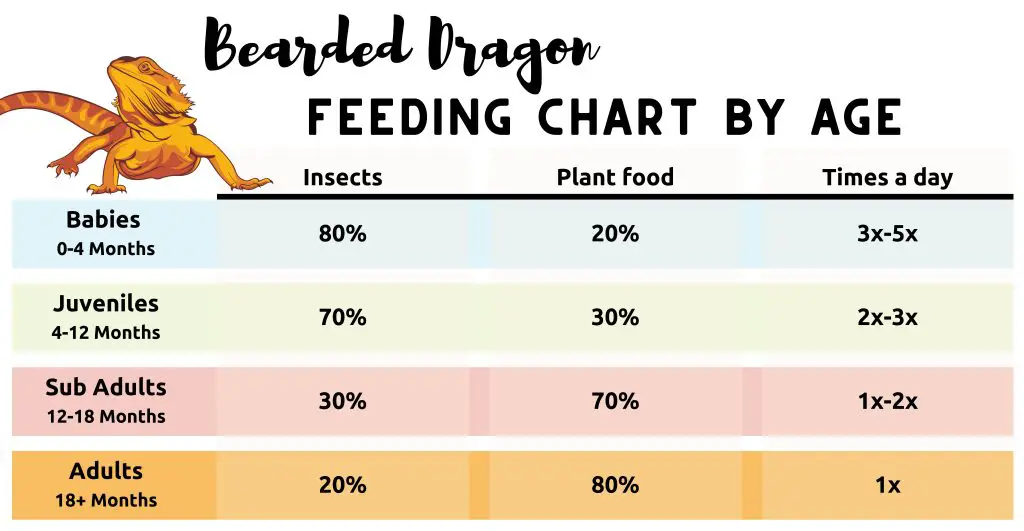
How Much Food to Give Your Bearded Dragon
Determining how much to feed your dragon is pretty simple. You’ll let your dragon choose how much to eat by only allowing a certain amount of time at each feeding. When feeding insects, you should allow just 10 minutes for your dragon to eat the insects, removing uneaten insects at the end of the time.
Vegetables and fruits work similarly. Once you put them in your dragon’s enclosure for feeding, only leave them in for 30 minutes. This gives your dragon time to eat its fill while preventing overfeeding and ensuring that leftover food doesn’t cause mold problems.
What To Do If A Bearded Dragon Is Not Eating
Before deciding what to do when your beardie is not eating, identify the reason for this behavior.
There can be various reasons, such as:
- Brumation
- Shedding
- Impaction
- Stress
- Wrong diet
- Vitamin deficiency
- Injury
Brumation
In the winter, bearded dragons go through a period of dormancy to help save energy. This is called brumation. Brumation starts in the winter as temperatures begin to cool and daylight shortens.
Bearded dragons lose their appetites during brumation and dig themselves into the substrate. Then, they can sleep for three or four months!
Brumation is a natural behavior. If your beardie starts to brumate, you should not try to stop it. Instead, you should:
- Lower the cage’s temperature to 72 to 75°F.
- Maintain a hot basking spot.
- Reduce all lighting to 8 to 10 hours per day.
Brumating dragons slow down their metabolism. They can go for three months without a full meal, but they will still drink. Many will snack on occasion to maintain an energy store. Make sure you offer food once a week to a brumating dragon and keep a constant water supply in the enclosure.
After brumation, his appetite will return quickly, and he should begin to eat again after five to seven days.
Shedding
As bearded dragons grow, they shed their outer layer of skin. Their skin becomes white and papery during this process and is rubbed off in patches.
A large adult may take two weeks to shed fully, while a juvenile may finish shedding in a day or two. Younger dragons can shed every month and sometimes every two weeks. Older adults may shed twice a year.
If you notice your bearded dragon is not eating as much as usual, check if he is about to shed. If you see white papery skin, this is the likely cause.
Before and during shedding beardies may eat less or not at all. They should generally be eating within a week after shedding.
Impaction
Impaction happens when food, or any item, gets stuck in your beardie’s intestinal tract and causes a blockage. This blockage is highly uncomfortable and leads to a bearded dragon not eating.
The most notable symptoms of impaction are a lack of appetite and a change in feces.
Unlike brumation, where his appetite slowly decreases, impaction occurs as a sudden lack of eating.
If you think your bearded dragon is impacted, then stop feeding and take him to a vet as soon as possible. Sometimes impaction can clear up on its own, but it usually requires a trip to the vet.
Stress
Not eating is the number one sign of stress in bearded dragons. Refusing food, lower activity levels, increased aggression, black beards, pacing, and glass surfing are signs of stress.
There are many causes of chronic stress:
- Wrong tank temperature or humidity.
- Small enclosure (less than 75-gallons).
- Bad diet.
- Improper handling.
- Illness.
Stress in bearded dragons is the most difficult to understand. If your pet appears stressed, begin going through the possible reasons above, starting with temperature and moving down the list.
It is normal for bearded dragons to be stressed when first brought home. However, this stress is not chronic and should reduce quickly within the first week.
Wrong Diet
A common reason for a bearded dragon not to eat is when it is fed the wrong foods.
Beardies are omnivorous insectivores. This means they eat mostly plants but get most of their protein from insects. You should not feed your bearded dragon foods like meat, fish, dairy, dead insects, and onions. Bearded dragons can sometimes be picky eaters.
Try offering a variety of fruits, veggies, and insects to find out which foods your bearded dragon likes.
Food variety is also a great way to ensure they get a healthy balance of vitamins, minerals, and nutrients.
Vitamin Deficiency
There are several vitamins that bearded dragons need to stay healthy. Vitamin E, A, and B1 are all essential to their diet.
A Vitamin E deficiency can cause a lack of appetite, but it is very rare.
Vitamin D is the vitamin that many bearded dragons lack. Calcium supplements are often mixed with vitamin D3, so dusting food with a calcium supplement will prevent any deficiency.
By feeding your beardie a balanced diet that has lots of leafy vegetables, you will prevent most, if not all, vitamin deficiencies.
If you think your lizard might have a vitamin deficiency, then take him to a vet to check his blood vitamin levels. Trying to self-dose your beardie with vitamins can result in an overdose.
Injury
An injured bearded dragon is likely to stop eating, especially if the injury is bad. Therefore, severe or infected injuries should always be treated by a vet.
You can clean minor injuries at home with warm water and an antibiotic. Usually, a small cut will not stop your bearded dragon from eating unless it is infected.
How To Feed A Sick Bearded Dragon
People who keep beardies need to be aware of their pet’s habits and watch out for signs and symptoms that indicate an illness. Some of the things a pet owner can do to take care of a sick bearded dragon include taking the pet to a vet, including special worms in its diet, and letting it recover in a quiet room.
If the beardie has no appetite, then feeding it liquid foods with a syringe may be necessary. Owners may also sprinkle multivitamin powders on the sick bearded dragon’s food to help improve immune functions and reduce vitamin deficiencies.
Keeping the sick bearded dragon well hydrated is essential, and some owners use a warm water bath. The beardie can soak in water that is shoulder deep, leaving its head well above the waterline.
A few people prefer to mist their dragons instead of bathing them in water dishes. However, regular water baths can help improve the condition of dehydrated or constipated beardies.
Bearded Dragon Hydration
Bearded dragons obtain most of their moisture through fruits and vegetables, but it’s essential to make sure they have water available. Always keep a water bowl in your dragon’s cage, but observe whether your dragon drinks out of it. Some dragons prefer to soak in their water bowl instead.
Beardies tend to urinate or leave solids in their bowl, so change their water regularly. After each feeding, remove any drowned insects from the bowl. If your dragon does not drink from the water bowl, spray a water mist into the cage twice daily. It will keep your pet hydrated.
What To Feed A Pregnant Bearded Dragon
A pregnant bearded dragon requires special care, which includes feeding it food high in nutrients such as calcium.
Kelp is a good source of calcium for bearded dragons. Calcium is the most vital nutrient to supply when caring for a pregnant bearded dragon. Supplements are required at least five times each week, and multivitamins should be administered three times a week.
Green vegetables, squash, cranberries, alfalfa sprouts, papayas, kelp, and wheatgrass are some high calcium foods that are good for a bearded dragon that’s expecting. As small pets, it is crucial to watch the food intake of these lizards, but pregnant bearded dragons require more nutrition and additional insect snacks such as silkworms.
What Do Bearded Dragons Eat In The Wild?
In the wild, bearded dragons are omnivorous, opportunistic predators. They will eat any prey they can subdue, including insects predominantly. They will also eat a variable amount of available greens.
The following are examples of food bearded dragons will eat in the wild.
- Dubia roaches
- Goliath worms
- Waxworms
- Mealworms
- Crickets
- Butter worms
- Earthworms
- Dandelions
Common Feeding Mistakes
Here are some of the common feeding mistakes to watch out for.
Overfeeding
Obesity in adult bearded dragons is very common. However, like most reptiles, bearded dragons have a healthy appetite and are prone to obesity if fed too many insects.
It is easy to accidentally overfeed as they will eat as many insects as you give them. Obesity is a significant health issue as it can predispose your bearded dragon to heart disease and joint problems.
Feeding Juveniles Mealworms
Feeding juveniles mealworms can stunt their growth and prevent them from receiving nutrients.
Mealworms have an outer shell made up of chitin that juveniles cannot properly digest. Therefore, avoid feeding bearded dragons mealworms, but as an option, feed them super worms when they reach 18 months of age instead.
Not Gut Loading
When feeding your bearded dragon live insects, it is vital to gut load them at least a day before feeding.
Gut loading involves feeding the insects fruits and vegetables dense in nutrients before feeding the insects to your bearded dragon. This process greatly improves the number of nutrients that your bearded dragon receives.
Conclusion
As mentioned previously, bearded dragons are omnivores and can eat various insects, fruit, and vegetables. One of the most important things about your bearded dragon’s diet is variety, they need a varied diet, and the amount of edible options makes them a fun reptile to feed
Continually research new food you want to introduce into your bearded dragon’s diet. Even food that seems healthy can have risks for your bearded friend. If you remain unsure, always ask your vet for advice.
Below here you’ll find an easy infographic with a lot of the most common foods, sorted by category, and if it’s something that can be fed to a bearded dragon or not.

Feel free to bookmark this page for quick reference on a particular food should you need it for the future, or share it on the web by copy/pasting the link below:
<a href="https://whatanimalseat.com/bearded-dragons/"><img style="width:100%;" src="https://whatanimalseat.com/wp-content/uploads/2022/06/what-do-bearded-dragon-eat-infographic-1.png"></a><br>What do bearded dragons eat infographic by <a href="https://whatanimalseat.com">WhatAnimalsEat.com</a>You might also like:
Can Bearded Dragons Eat Tomatoes?
Can Bearded Dragons Eat Blackberries?
Can Bearded Dragons Eat Pumpkin?
Can Bearded Dragons Eat Pineapple?
Can Bearded Dragons Eat Cantaloupe?
Can Bearded Dragons Eat Cherries?
Can Bearded Dragons Eat Cauliflower?
Can Bearded Dragons Eat Brussel Sprouts?
Can Bearded Dragons Eat Nightcrawlers?
Can Bearded Dragons Eat Eggs?
Can Bearded Dragons Eat Cicadas?
Can Bearded Dragons Eat Basil?
Can Bearded Dragons Eat Grasshoppers?
Can Bearded Dragons Eat Hornworms?
Can Bearded Dragons Eat Grass?
Can Bearded Dragons Eat Bok Choy?
Can Bearded Dragons Eat Corn?
Can Bearded Dragons Eat Arugula?
Can Bearded Dragons Eat Zucchini?
Can Bearded Dragons Eat Cucumbers?
Can Bearded Dragons Eat Cilantro?
Can Bearded Dragons Eat Radishes?
Can Bearded Dragons Eat Plums?
Can Bearded Dragons Eat Chicken?
Can Bearded Dragons Eat Spinach?
Can Bearded Dragons Eat Red Cabbage?
Can Bearded Dragons Eat Dragon Fruit?
Can Bearded Dragons Eat Green Onions?
Can Bearded Dragons Eat Ants?
Can Bearded Dragons Eat Mint?
Can Bearded Dragons Eat Radicchio?
Can Bearded Dragons Eat Flies?
Can Bearded Dragons Eat Carrots?
Can Bearded Dragons Eat Spiders?
Can Bearded Dragons Eat Cherry Tomatoes?
Can Bearded Dragons Eat Pomegranate?
Can Bearded Dragons Eat Cheese?
Can Bearded Dragons Eat Rosemary?
Can Bearded Dragons Eat Pumpkin Seeds?
Can Bearded Dragons Eat Popcorn?
Can Bearded Dragons Eat Honeydew?
Can Bearded Dragons Eat Jalapenos?
Can Bearded Dragons Eat Dill?
Can Bearded Dragons Eat Leeks?
Can Bearded Dragons Eat Tangerines?
Can Bearded Dragons Eat Ham?
Can Bearded Dragons Eat Sugar Snap Peas?
Can Bearded Dragons Eat Bananas?
Can Bearded Dragons Eat Collard Greens?
Can Bearded Dragons Eat Slugs?
Can Bearded Dragons Eat Beets?
I am a huge animal lover and have four dogs, a Labrador, Jack Russell, Pug, and Teacup Yorkie. I also have a cat and a Cockatiel. I have had pets since I was a toddler, and there was not a day when there wasn’t an animal in my house.

